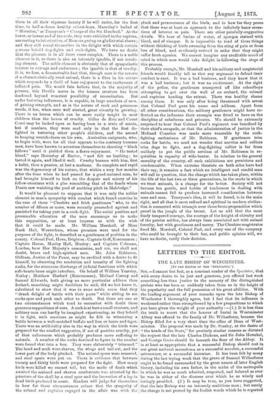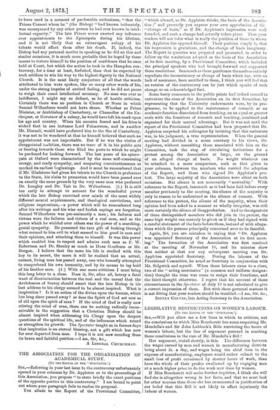LETTERS TO THE EDITOR.
THE LATE BISHOP OF WINCHESTER.
[TO THE EDITOR OF THR esesere.r0a.-1 Sia,—I cannot but feel, as a constant reader of the Spectator, that with every desire to be just and generous, you offered last week something less than justice to the memory of the distinguished prelate who has been so suddenly taken from us in the height of his popularity and the full possession of his great abilities. With the leading argument of your remarks upon the late Bishop of Winchester I thoroughly agree, but I feel that its influence is weakened rather than strengthened by a few propositions to which you have given the weight of your authority : —(1.) It is less than the truth to assert that the honour of burial in Westminster Abbey was offered to the family of Dr. Wilberforce, because the Bishop filled for a very short time the office of Dean of West- minster. The proposal was made by Dr. Stanley, at the desire of " the heads of the State," for precisely similar reasons as dictated the request that the late Charles Dickens, and Sir John Herschel, and George Grote should lie beneath the floor of the Abbey. It is at least as appropriate that a successful Bishop should rest in our great national mausoleum as a successful novelist, a successful astronomer, or a successful historian. It has been felt by many during the last trying week that the grave of Samuel Wilberforce ought to be found surrounded by the great names of later English history, including his own father, in the midst of the metropolis in which he was as much admired, respected, and beloved as ever he was in either of the dioceses over which he so wisely and lovingly presided. (2.) It may be true, as you have suggested, that the late Bishop was an intensely ambitious man ; but surely the charge is not proved by the foolish words which he is reported to have used in a moment of pardonable enthusiasm, " that the Prince Consort whom he" (the Bishop) " had known intimately, was unsurpassed by any other person he had ever known in intel- lectual capacity." The late Prince never exerted any influence over appointments to the Episcopate during his lifetime, and it is not likely that an extravagant eulogy of his talents would affect them after his death. If, indeed, the Bishop had any personal motive in speaking as he did on this and similar occasions, it is much more probable that he hoped by these means to restore himself to the position of confidence that he once held at Court, but which the action he took in the Hampden con- troversy, for a time at least, forfeited, than that he expected by such artifices to win his way to the highest dignity in the National Church. It is the most likely conjecture of all that the words attributed to him were spoken, like so many other words of his, under the strong impulse of excited feeling, and be did not pause to weigh their exact intellectual accuracy. No man was ever so indifferent, I might say so defiant, as he of hostile criticism. Certainly there was no position in Church or State in which Samuel Wilberforce would not have shone. Whether as Prime Minister, or Archbishop of Canterbury, or Chancellor of the Ex- chequer, or Governor of a colony, he would have left his mark upon his age and country. When his enemies feared and his friends wished that in one instance Lord Palmerston, and in another Mr. Disraeli, would have preferred him to the See of Canterbury, -it was not to be wondered at that he himself believed that such an appointment was not improbable. But if he was the victim of disappointed ambition, there was no trace of it in his public acts or bearing towards those who filled the posts to which he might be pardoned for looking forward. The last years of his episco- pate at Oxford were characterised by the same self-consuming energy, and ready sympathy, and unsparing conscientiousness as marked its earliest beginnings. And it must be remembered that if Mr. Gladstone had given his talents to the Church in preference to the State, his claim to promotion would have been passed over on exactly the same grounds by the very same men who preferred Dr. Longley and Dr. Tait to Dr. Wilberforce. (3.) It is still too early to attempt to account for the wonderful power which the late Bishop exercised over winds of the most widely different mental acquirements, and theological convictions, and religious impressions,—a power which will be remembered long after his writings and his wise and foolish sayings are forgotten. Samuel Wilberforce was pre-eminently a man ; his failures and virtues were the failures and virtues of a real man, and so the power which he wielded over others was the power of a searching, genial sympathy. He possessed the rare gift of looking through -what seemed to him evil to what seemed to him good in men and their opinions, and attaching them to himself. It was this power which enabled him to respect and admire such men as F. W. Robertson and Dr. Stanley as much as Dean Goulburn or Mr. I3urgon. I believe that the more his life is studied with this key to its secret, the more it will be realised that an actual, earnest, living man has passed away, one who honestly attempted to comprehend his own humanity, and by its means to lay hold of his brother men. (4 ) With one more criticism I must bring this long letter to a close. Does it, Sir, after all, betray a fatal want of discrimination between the real and the unreal that the Archdeacon of Surrey should assert that the late Bishop in his last address to his clergy seemed to be almost inspired. What is inspiration ? Is it an action of the divine upon the human, which has long since passed away? or does the Spirit of God act now as of old upon the spirit of man ? If the mind of God is really now stirring the mind of man, there can be nothing radically incon- ceivable in the suggestion that a Christian Bishop should be almost inspired when addressing his Clergy upon the deepest ,questions of the spiritual life, and of the influences which retard or strengthen its growth. The Spectator taught us in former days 'that inspiration is an eternal blessing, not a gift which has now for ever departed from man. I hope it is not now receding from dts brave and faithful position.—I am, Sir, &c., A LIBERAL CHURCHMAN.































 Previous page
Previous page